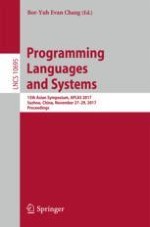2017 | Buch
Programming Languages and Systems
15th Asian Symposium, APLAS 2017, Suzhou, China, November 27-29, 2017, Proceedings
herausgegeben von: Bor-Yuh Evan Chang
Verlag: Springer International Publishing
Buchreihe : Lecture Notes in Computer Science
